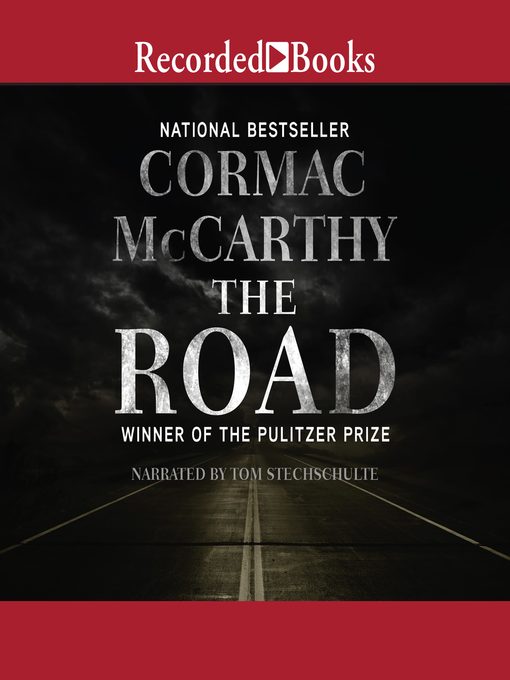
The Road
فرمت کتاب
audiobook
تاریخ انتشار
2007
Lexile Score
670
Reading Level
3
نویسنده
Tom Stechschulteناشر
Recorded Books, Inc.شابک
9781436100793
کتاب های مرتبط
- اطلاعات
- نقد و بررسی
- دیدگاه کاربران
نقد و بررسی

Those familiar with McCarthy's unique spare writing style will find Tom Stechschulte's performance of THE ROAD a good fit. Stechschulte's voice maintains a somber, growling quality that suits the mournful story of a father and son, two survivors journeying across a scorched America. McCarthy's riveting descriptions of setting and characters are delivered at a measured pace and with a rich depth that is appealing from opening line to closing scene. Although the story's subject matter is truly bleak, Stechschulte's capable performance is offered in an accessible tone that complements McCarthy's skilled prose. In a way, McCarthy and Stechschulte share a common gift. Both are masters at conveying significant meaning with little fanfare and peerless results. L.B.F. (c) AudioFile 2007, Portland, Maine

Starred review from July 24, 2006
Violence, in McCarthy's postapocalyptic tour de force, has been visited worldwide in the form of a "long shear of light and then a series of low concussions" that leaves cities and forests burned, birds and fish dead and the earth shrouded in gray clouds of ash. In this landscape, an unnamed man and his young son journey down a road to get to the sea. (The man's wife, who gave birth to the boy after calamity struck, has killed herself.) They carry blankets and scavenged food in a shopping cart, and the man is armed with a revolver loaded with his last two bullets. Beyond the ever-present possibility of starvation lies the threat of roving bands of cannibalistic thugs. The man assures the boy that the two of them are "good guys," but from the way his father treats other stray survivors the boy sees that his father has turned into an amoral survivalist, tenuously attached to the morality of the past by his fierce love for his son. McCarthy establishes himself here as the closest thing in American literature to an Old Testament prophet, trolling the blackest registers of human emotion to create a haunting and grim novel about civilization's slow death after the power goes out. 250,000 announced first printing; BOMC main selection.

December 4, 2006
McCarthy's latest novel, a frightening apocalyptic vision, is narrated by a nameless man, one of the few survivors of an unspecified civilization-ending catastrophe. He and his young son are trekking along a treacherous highway, starving and freezing, trying to avoid roving cannibal armies. The tale, and their lives, are saved from teetering over the edge of bleakness thanks to the man's fierce belief that they are "the good guys" who are preserving the light of humanity. In this stark, effective production, Stechschulte gives the father an appropriately harsh, weary voice that sways little from its numbed register except to urge on the weakening boy or soothe his fears after an encounter with barbarians. When they uncover some vestige of the former world, the man recalls its vanished wonder with an aching nostalgia that makes the listener's heart swell. Stechschulte portrays the son with a mournful, slightly breathy tone that emphasizes the child's whininess, making him much less sympathetic than his resourceful father. With no music or effects interrupting Stechschulte's carefully measured pace and gruff, straightforward delivery, McCarthy's darkly poetic prose comes alive in a way that will transfix listeners. Simultaneous release with the Knopf hardcover (Reviews, July 24).

July 15, 2007
McCarthy has written two survival tales, with unnamed characters traveling westward through desolate landscapes. Mercifully unique, Blood Meridian (1985) presents gruesome horror as literary Western, sketching the adventures of an unidentified teen who joins a marauding gang of scalp hunters in the 1850s Southwest. The first three hours are a tour de force of sustained repellency, piling atrocity upon atrocity before settling into a more sustainable rate of a massacre or two per chapter. McCarthy's achievement here is his prose, not quite biblical, not quite Faulknerian, much of it unfamiliar enough to sound made up. Reader Richard Poe groans the lines, and if he only uses a few voices, most of the characters seem meant to be indistinguishable. Widely regarded as a modern classic, however unpleasant, this title belongs in most library collections.Bleak as it is, Road seems much more palatable in comparison, offering compassion in the person of a dying father who protects and cares for his son as they travel through a world shattered by an unexplained apocalypse. Starving and exhausted, they travel to the Pacific, scavenging food when they can and keeping other rapacious, cannibalistic survivors at bay. The boy tells himself they're the "good guys" and "carry the flame," but the father does what he must to survive. Veteran reader Tom Stechschulte navigates McCarthy's arcane language, emphasizing the pair's shared tenderness, in a wonderfully moving tale.Road 's Pulitzer Prize and Oprah selection speak for themselves; essential.-John Hiett, Iowa City P.L.
Copyright 2007 Library Journal, LLC Used with permission.

























دیدگاه کاربران